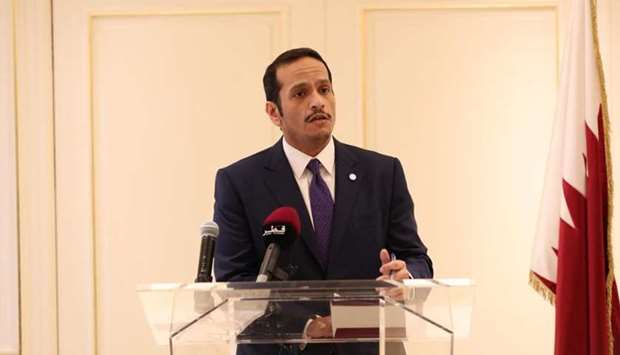HE the Deputy Prime Minister and Minister of Foreign Affairs Sheikh Mohamed bin Abdulrahman al-Thani has said the political crisis facing the Gulf following the unjust siege on Qatar can only be solved by dialogue and requires statesmanship.
“The crisis cannot be resolved by stubbornness. We are countries, not children," Sheikh Mohamed said at a press conference in New York on Friday.
He was speaking after a meeting hosted by the United States in New York which was attended by the foreign ministers of the Gulf Co-operation Council, Egypt and Jordan.
Sheikh Mohamed expressed Qatar's appreciation for the efforts made by US President Donald Trump to resolve the Gulf crisis, but said the siege countries have not responded positively.
He hoped that wisdom would prevail and that these countries would emerge from a state of denial, and hold talks to discuss the causes of the crisis.
The Deputy Prime Minister and Minister of Foreign Affairs said Qatar has social and cultural links and joint borders with the GCC countries; however, these countries keep saying that they do not need Qatar and that they are ready to continue with the siege for 50 years.
"Is this how politics is practised? Is this how priorities are determined? Is this how issues affecting people's destinies are dealt with? It is up to them because Qatar does not receive aid from these countries and does not rely on them for anything, and from this superficial perspective, we can tell them, 'We also do not need you,’" Sheikh Mohamed said.
Washington succeeded in bringing together the GCC countries, something the organisation has failed to achieve over the past year-and-a-half of the siege, he said.
The meeting discussed several issues, including security and regional challenges and the "Middle East Strategic Alliance" initiative.
Qatar stressed the importance for the initiative to be based on clear principles and to work on the basis of a dialogue characterised by transparency and credibility, the Deputy Prime Minister and Minister of Foreign Affairs said.
The current situation requires addressing the challenges between these countries first before any collective movement can be launched to tackle regional challenges as a whole, he said.
He underlined that there are key principles that must be an integral part of any coalition, which are respect for the sovereignty of states and the independence of their policy; the realisation of the collective interests of the peoples gathered by this alliance; and to be based on clear and neutral criteria.
Responding to a question on a statement by an Emirati official that the Gulf crisis is no longer a priority, the Deputy Prime Minister and Minister of Foreign Affairs said the crisis was first created without any reason and began with a cybercrime committed by known perpetrators.
There are challenges and greater priorities facing the region, he said, but the paralysis of the GCC prevents any progress on regional issues such as Syria, Yemen and Libya, he said.
He underlined that Qatar only demands that the siege countries retreat from the illegal measures they carried out against the Qatari people, and "this is a priority for us."

